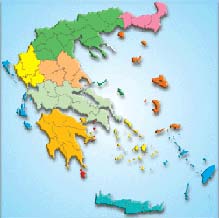
Please click on the map,
the region you want to visit |
|
|
|
|
| |
|
 |
History, Culture of Lesvos |
|
History
In prehistoric times it had many names as Lasia, Imerti, Pelasgia, Issa, etc. The legend states that the first settler was Makaras, son of Helios, the most famous among the legendary kings who had five daughters: Mytilene, Mythimna, Issa, Antissa and Arisvi and four sons: Eresos, Kydrolaos, Neandros and Leucippus.
The daughters and the sons of Makaras gave their names to the main cities of the island, which exist till today! The current name of "Lesvos" comes from Lesvo, son of the Thessalian hero Lapithos, Mythimna's husband.
The path of the island in history is significant and impressive, like many cities and regions of Greece. The archaeological finds indicate that the island developed a civilization comparable to the Mycenaean civilization, which was destroyed and the island was abandoned after the flood of Deucalion, in 1529 BC.
In 1507 BC, the Pelasgians came and in 1393-1184 BC it was inhabited by Achaeans.
In around 1000 BC, the Aeolian Penthilidon colony established in Lesvos, which developed and flourished, expanding its settlement activity at the opposite coast of Asia Minor which took the name "Mytilene Aghialos". In this region, near the tomb of Achilles, the Mytilians built the city of Achillio.
In the mid-7th century BC, they expanded throughout the Troada and became a naval power.
They allied with Athens, and then with Spartans, they were punished hard by the Athenians and follow the same route of other ancient Greek cities: acne, decline.
Then the Romans, Byzantines, Crusaders, Saracens, Latinos, were the occasional invaders of the island, which others looted and others freed it.
On October 14, 1462, the Turks pillaged it, massacred the residents of the island and, from the 100,000 residents, they left on the island only thirty thousand people.
Lesvos was set free in December 1912 and its full integration with Greece became in 1914.
The island was suffered another occupation during the Second World War, when the German army occupied it, in 1941. The occupation lasted until 1944.
Culture
Lesvos, throughout its long history, has timeless spiritual personalities: Terpandros (700 BC), creator of lyric poetry, Pittakos (648 BC), one of the seven wise men of antiquity, Arion (625 BC), a gifted lyric poet and music teacher, Alcaeus (600 BC), an also prominent lyric poet and Sappho (620 BC) the greatest poet of antiquity, whose poems are distinguished by passion and sensuality, and she is fairly characterized as the "Tenth Muse".
Other important personalities are Theophrastus (372 BC), an excellent philosopher and botanist, known as the "father" of botanology and Theophanes (100 BC), an important historian and follower of Pompeius at the campaigns in Asia Minor.
During the Roman - Byzantine era, there was a relative stagnation. The first years of Turkish rule, it was in a state of spiritual slumber, but in the 15th century AD, the spiritual life began to resurgence, by the spiritual center of Holy Limonos Monastery.
"If there are so few "rich" men in our time, it is because few men, really few, know how to see. Especially on an island like Lesvos, which is trying to boast such a rich and pure food for the eyes, you would say that someone must be crazy or blind to stay away from the light".
ODYSSEAS ELYTIS.
The 18th century, important figures appear such as Ignatius of Hungaro-Vlachia and Benjamin of Lesvos, the chief teacher of Nation. In the 19th century, the brothers Demetrius and Gregory Vernardakis, George Aristides and Christopher Lailios support Greek education and the intellectual life of the place.
In the 20th century, Argyris Eftaliotis revitalizes the Modern Literature, and then the great novelists Stratis Myrivilis and Elias Venezis offer by their work an anti-war and humanitarian impulse to a global audience. Asimakis Panselinos, Nikos Kambas, S. Paraskevidιs, M. Kountouras, illuminate the Lesvian Spring along with the poetry of Nobel laureate Odysseas Elytis, of Lesvian origin, and together with Sappho who made known, throughout the world, the unique and special nature of the island.
The painting has also to present, in the late 19th and early 20th century, by its own celebrities: Kontoglou, G. Iacovidis, Sp. Protopatsis, Or. Kanellis, the folk painter Theophilos Hadjimichael and also the inspired art book publisher Stratis Eleftheriadis - Teriant, who is added to the list of Lesvian authors.
Until today - the 21st-century - the intellectual life on the island continues by many notable men of literature and by cultural associations that contribute to the perpetuation of an endless Lesvian Spiritual Spring.
|
| Source: Prefecture of Lesvos. |
|
|